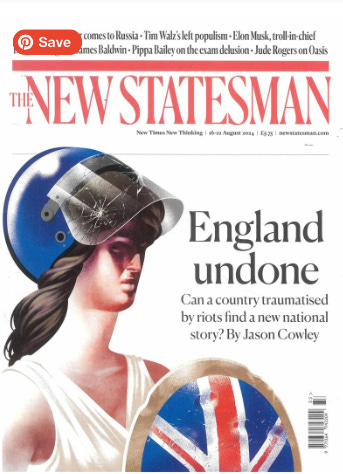The Riot Apologists and Their Once Progressive Fellow Travellers
Jon Bloomfield and David Edgar take issue with a populist narrative currently being buttressed by the one-time flagship of progressive thinking, the New Statesman
As ugly race riots erupted across many English cities after the shocking murder of three young girls at a summer holiday dancing class in Southport, the leading commentators and ideologues of the national-populist right have hurried to build a counter-narrative to explain what they call “protests”, a narrative which has been buttressed by the once-progressive New Statesman.
In seeking to blame the riots on what chief national-populist advocate Matthew Goodwin calls “the elite class” the right is confronting a quandary. Over the last decade and more, they have been making the political weather – in the UK, across Europe and in the United States.
To forge new cross-class coalitions on the right of politics they have prioritised cultural wars – on religion, the family, abortion, and most frequently on race and migration – and used these issues to exploit the insecurity experienced by millions of working people as incomes have stagnated.
Now rioters, egged on and encouraged via social media by movers and shakers on the far right, attacked mosques, fire-bombed hotels housing asylum seekers and assaulted the police, while chanting the Sunak era slogan ‘stop the boats’ and ‘enough is enough’.
As the disturbances died down and public opinion polling showed that a mere 7% supported the rioters, these commentators felt obliged to distance themselves from the perpetrators. But in Matthew Goodwin’s inimitable words, they asked ‘What did you seriously expect?’
Ever since, they have been seeking to shape the debate to fit in with their populist agenda.
Caricatures of Modern Britain
They begin by denying the explicit racist nature of the disturbances, insisting that the rioters were local, not that violent, and certainly not inspired by the fascist right. Frank Furedi, the one-time guru of the Revolutionary Communist Party and now Hungarian Prime Minister Viktor Orbán’s frontman in Brussels, minimised the violence and its racist character.
For him, it was “communal conflicts”, “spontaneous outrage ...that led to the spread of essentially small-scale localised rioting for 2-3 days” Both he and Goodwin are desperate to minimise the role of the far right in both organising and directing the riots.
Rather, as Goodwin’s Substack headline expresses it, “the protests reflect DECADES of elite failure.” (Note how race riots turn seamlessly into ‘protests’ and core responsibility lies with the supposedly liberal ‘elite’) In Goodwin’s eyes, in a de facto endorsement of the riots, “many ordinary people are now taking to the streets to vent their anger and frustration over the general direction of the country.”
To support this claim, Goodwin and fellow pundits like Melanie Phillips have to draw a caricature of modern Britain. They paint an alarmist picture of a lawless, criminal country. Goodwin writes that “the sheer scale of the lawlessness, the chaos, the breakdown of social order, and the glaring loss of control becomes impossible to ignore.”
Until you look at the figures.
Here we find that violence offences in the year ending September 2023 were 28% lower compared with the pre-coronavirus (COVID-19) pandemic year ending March 2020, largely because of a 31% fall in violence with injury offences during this period. This follows a general downward trend in violent crime since its peak in 1995.
Indeed, the 2023 figure is more than 50% lower than in 1981, when these records began, even though the UK population is significantly higher, as Goodwin regularly reminds us.
Secondly, Goodwin and his fellow ideologues argue that newcomers and migrants have a propensity to criminality. They present child abuse and the incidence of ‘grooming’ gangs as an exclusive Asian activity; and deliberately conflate individual acts of political terrorism with Muslims in general.
Thus, speaking on Nicky Campbell’s BBC Radio 5 Live show on 2 August, Goodwin spoke about ‘Islamic terrorism’. This is equivalent to categorising IRA attacks in the 1980s as ‘Catholic terrorism’. No one argued this then – and no one should now.
Similarly, with child abuse, no-one makes the case that Irish people have a propensity to paedophilia because of the extensive abuse practised for decades by Catholic clergy in both Ireland and England. Progressives stand resolute against all terrorism and abuse, whoever undertakes it, but should refuse to let populists weaponise these topics for sectarian ends.
Thirdly, this argument spills over into a claim that multi-cultural Britain is riven by ethnic conflict. Writing in the Telegraph Nick Timothy, former top aide to Prime Minister Theresa May, claims “There is no future for a multiracial country in balkanising itself into a series of ethnic enclaves existing side by side but entirely separated from one another.”






